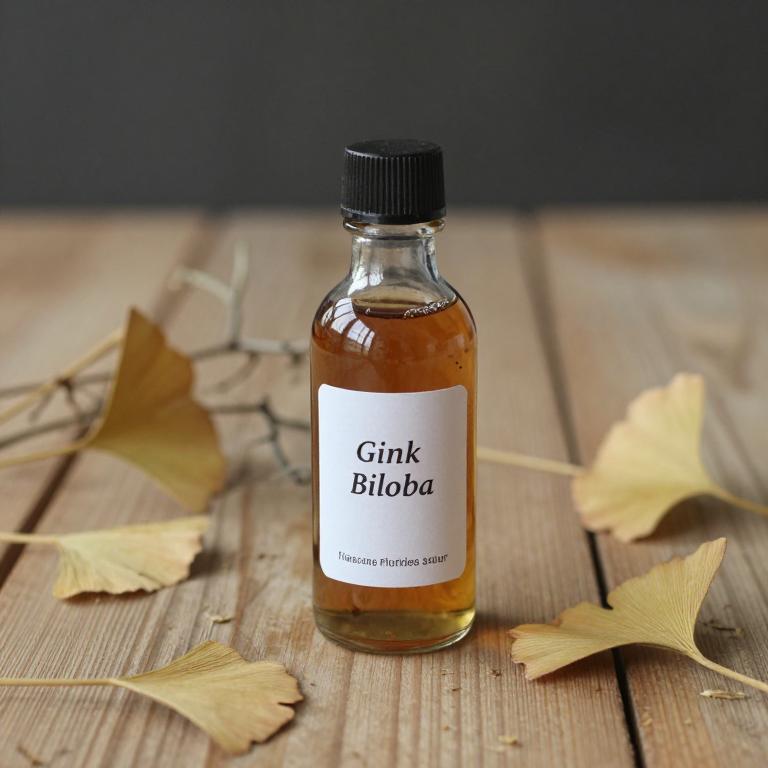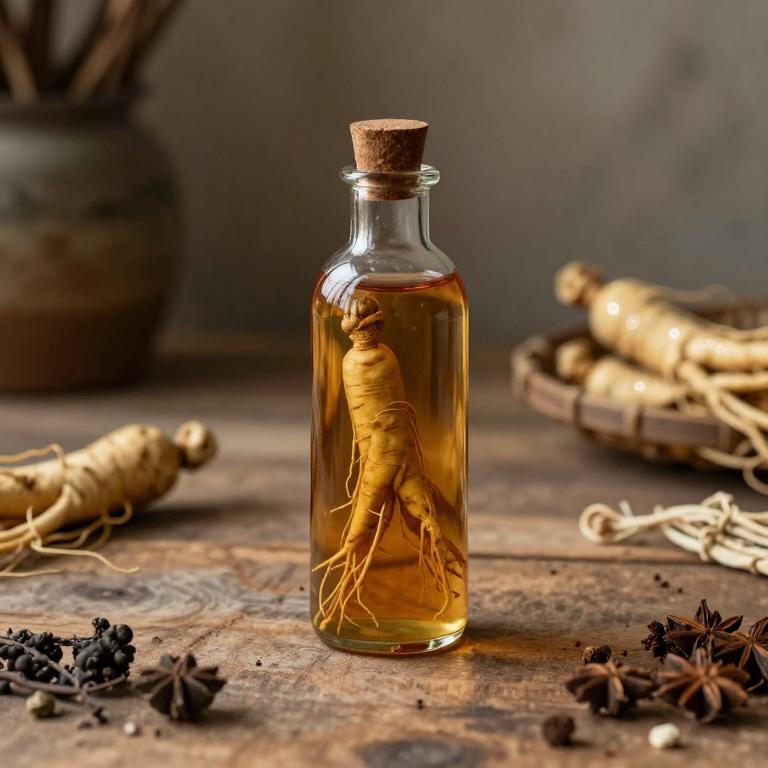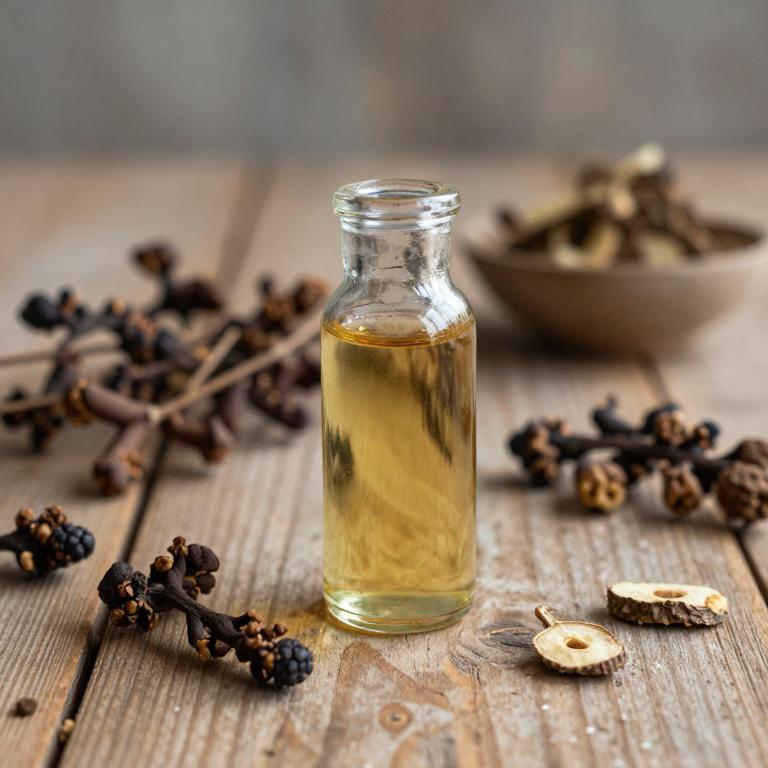10 Best Herbal Syrups For Aging

Herbal syrups have gained popularity as natural remedies for supporting aging populations, offering a blend of traditional wisdom and modern wellness.
These syrups often contain ingredients like ginseng, ashwagandha, and turmeric, which are known for their potential to enhance energy, reduce inflammation, and support cognitive function. They are typically easy to consume and can be customized to address specific health concerns, making them a versatile option for seniors. However, it is important to consult with healthcare professionals before incorporating herbal syrups into a daily routine, as they may interact with medications or have varying effects on different individuals.
Despite their benefits, herbal syrups should be viewed as complementary rather than a substitute for comprehensive medical care.
Table of Contents
- 1. Ginkgo (Ginkgo biloba)
- 2. Panax ginseng (Panax ginseng)
- 3. Turmeric (Curcuma longa)
- 4. St. john's wort (Hypericum perforatum)
- 5. Salvia (Salvia officinalis)
- 6. Thistle (Silybum marianum)
- 7. Chaste tree (Vitex agnus-castus)
- 8. Echinacea (Echinacea purpurea)
- 9. Stinging nettle (Urtica dioica)
- 10. Ashwagandha (Withania somnifera)
1. Ginkgo (Ginkgo biloba)

Ginkgo biloba herbal syrups are popular supplements derived from the leaves of the ancient ginkgo tree, known for their potential cognitive and circulatory benefits.
These syrups are often used to support brain function, improve memory, and enhance blood flow, making them a common choice for individuals seeking to support aging-related health concerns. The active compounds in ginkgo biloba, such as flavonoids and terpene lactones, are believed to act as antioxidants and anti-inflammatory agents. While some studies suggest that ginkgo biloba may help with age-related cognitive decline, more research is needed to confirm its efficacy.
As with any herbal supplement, it is important to consult a healthcare provider before use, especially for older adults who may be on other medications.
2. Panax ginseng (Panax ginseng)

Panax ginseng herbal syrups have gained popularity for their potential benefits in supporting aging populations, as they are traditionally used to enhance vitality and reduce fatigue.
These syrups are often made from the root of the Panax ginseng plant, which is rich in bioactive compounds like ginsenosides that may support cognitive function and immune health. Some studies suggest that ginseng can help improve energy levels and mental clarity, making it a popular supplement for older adults seeking to maintain their quality of life. However, it is important to consult with a healthcare professional before using ginseng syrups, as they may interact with certain medications or have side effects in some individuals.
Overall, while Panax ginseng syrups may offer supportive benefits for aging, they should be used as part of a balanced lifestyle and under appropriate guidance.
3. Turmeric (Curcuma longa)

Curcuma longa, commonly known as turmeric, has been widely studied for its potential health benefits, particularly in the context of aging.
Herbal syrups made from curcuma longa are gaining popularity as natural remedies for supporting cognitive function, reducing inflammation, and promoting overall wellness in older adults. These syrups often contain curcumin, the active compound in turmeric, which is believed to have antioxidant and anti-inflammatory properties. When consumed regularly, curcuma longa syrups may help in managing age-related conditions such as arthritis, dementia, and metabolic disorders.
However, it is important to consult with a healthcare professional before incorporating these syrups into a daily regimen, especially for individuals with existing health conditions or those taking medications.
4. St. john's wort (Hypericum perforatum)

Hypericum perforatum, commonly known as St. John's Wort, has been traditionally used for its potential mood-enhancing properties, and herbal syrups made from this plant are gaining attention for their possible benefits in supporting aging individuals.
These syrups are often prepared using the dried and crushed leaves and flowers of the plant, which are rich in flavonoids and hypericin, compounds believed to have antioxidant and anti-inflammatory effects. For aging populations, hypericum perforatum syrups may help in managing symptoms of mild depression and improving overall emotional well-being. However, it is important to note that they can interact with certain medications, so consultation with a healthcare provider is recommended before use.
Despite these considerations, the herbal syrup remains a popular natural remedy for promoting mental clarity and emotional balance in older adults.
5. Salvia (Salvia officinalis)

Salvia officinalis, commonly known as sage, has been traditionally used in herbal medicine for its potential health benefits, particularly for aging populations.
Sage herbal syrups are often prepared using the leaves of the plant, which are rich in antioxidants and phytochemicals that may support cognitive function and reduce inflammation. These syrups are popular in natural remedies for their purported ability to improve memory, enhance mental clarity, and support overall vitality in older adults. Some studies suggest that compounds in sage, such as rosmarinic acid, may have neuroprotective properties that could be beneficial for age-related cognitive decline.
However, it is important to consult with a healthcare provider before using sage syrups, as they may interact with certain medications or have contraindications for specific health conditions.
6. Thistle (Silybum marianum)

Silybum marianum, also known as milk thistle, is a popular herbal remedy often used in the form of syrup to support liver health, which is particularly beneficial for aging individuals.
The active compound, silymarin, is believed to have antioxidant and anti-inflammatory properties that may help protect liver cells from damage. Herbal syrups made from Silybum marianum are typically taken orally and are considered safe for most adults, though they should be used under the guidance of a healthcare professional. As people age, the liver's ability to detoxify the body can decline, making silybum marianum syrup a potential supplement for maintaining liver function.
However, it is important to note that while some studies suggest benefits, more research is needed to fully understand its efficacy and long-term effects in older adults.
7. Chaste tree (Vitex agnus-castus)

Vitex agnus-castus, commonly known as chasteberry, has been traditionally used in herbal medicine for its potential benefits in supporting hormonal balance, particularly in women.
Herbal syrups made from Vitex agnus-castus are often formulated to address symptoms related to aging, such as menopausal discomfort, irregular menstrual cycles, and mood swings. These syrups are typically made by extracting the plant's active compounds through a gentle process that preserves their potency. As people age, the use of such herbal remedies may help promote overall wellness and emotional stability.
However, it is important to consult with a healthcare provider before starting any new herbal supplement, especially for individuals with pre-existing conditions or those taking other medications.
8. Echinacea (Echinacea purpurea)

Echinacea purpurea, commonly known as purple coneflower, is a popular herbal remedy often used to support the immune system, particularly during the cold and flu season.
Herbal syrups made from Echinacea purpurea are gaining popularity among older adults due to their potential anti-inflammatory and immune-boosting properties. These syrups are typically prepared by extracting the plant's active compounds through steam distillation or alcohol extraction, ensuring a concentrated and palatable form for easier consumption. As people age, their immune systems may weaken, making them more susceptible to infections, and Echinacea syrups are often considered a natural alternative to conventional remedies.
However, it is important to consult a healthcare provider before using Echinacea, especially for individuals with chronic conditions or those taking other medications.
9. Stinging nettle (Urtica dioica)

Urtica dioica, commonly known as stinging nettle, has been traditionally used in herbal medicine for its potential health benefits, including its role in supporting aging populations.
Herbal syrups made from Urtica dioica are often rich in vitamins, minerals, and antioxidants, which may help combat oxidative stress and support overall vitality. These syrups are believed to promote joint health, enhance energy levels, and support immune function, making them a popular choice for older adults seeking natural wellness options. However, it is important to consult with a healthcare professional before use, especially for individuals with existing medical conditions or those taking medications.
When properly prepared and consumed in recommended doses, Urtica dioica herbal syrups may offer a complementary approach to maintaining health and well-being in aging individuals.
10. Ashwagandha (Withania somnifera)

Withania somnifera, commonly known as ashwagandha, is a traditional Ayurvedic herb that has gained popularity for its potential benefits in supporting aging populations.
Herbal syrups made from Withania somnifera are often used to promote overall wellness, reduce stress, and enhance vitality in older adults. These syrups are believed to support cognitive function, improve sleep quality, and boost immune health, which are crucial aspects of aging. The adaptogenic properties of ashwagandha may help the body manage stress more effectively, contributing to better physical and mental well-being.
As a natural supplement, Withania somnifera syrups offer a holistic approach to aging, aligning with the growing interest in integrative and preventive healthcare.